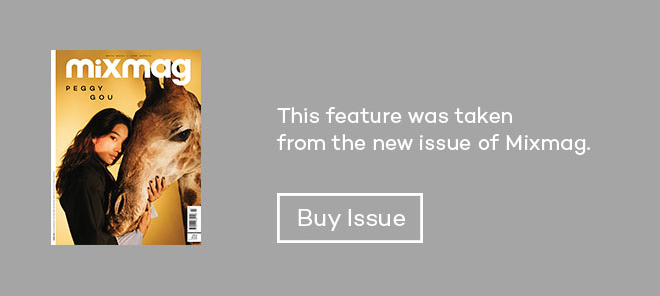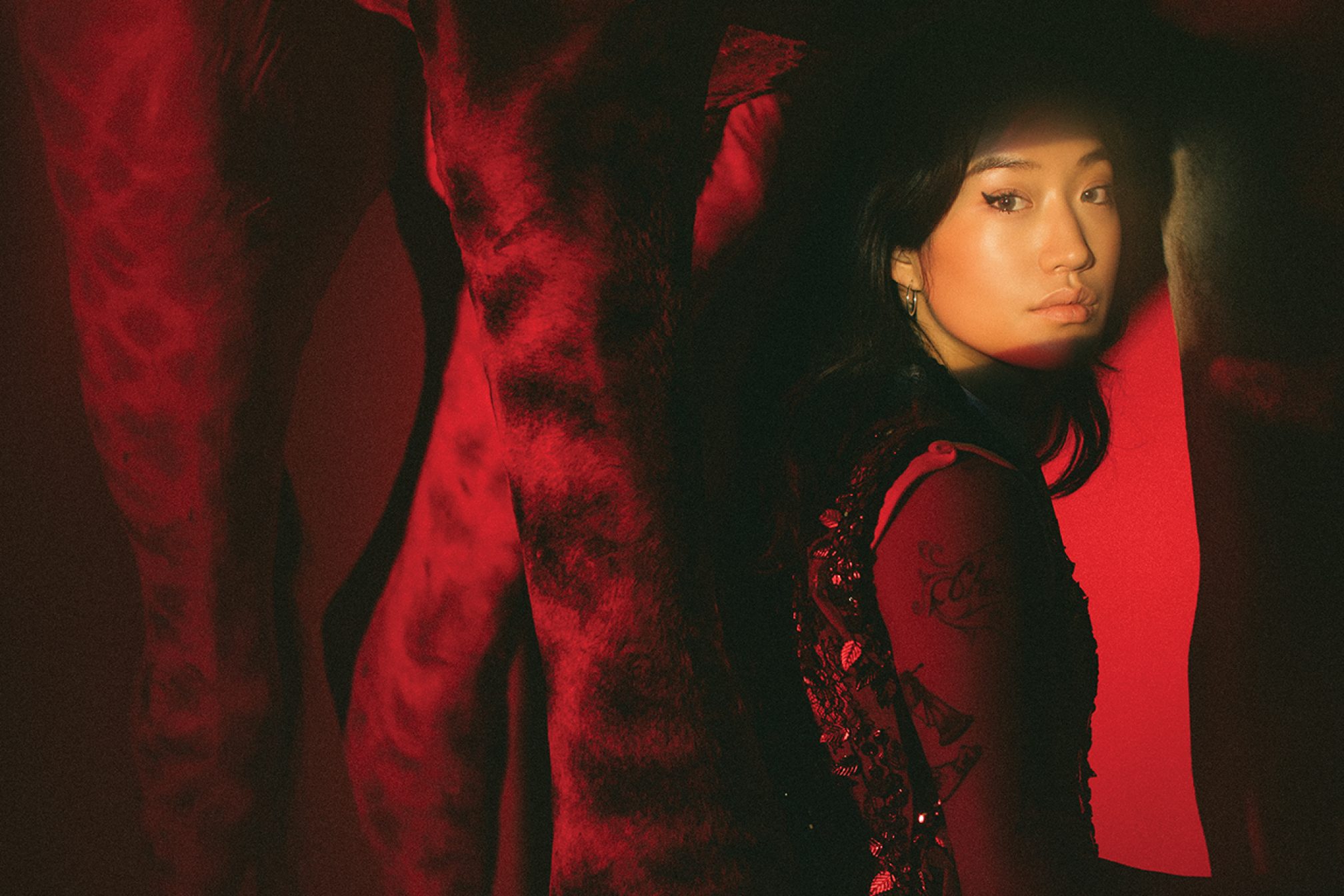 Cover stars
Cover stars
Peggy Gou: Welcome to the age of Gou-mania
Peggy Gou once said that she wanted to be the first South Korean DJ to play Berghain. She's since achieved that, and much, much more.
Strolling briskly up the stairs of the Barbican exhibition space, whipping up a small whirlwind behind her with her long green trenchcoat, Peggy Gou stops abruptly at the very first painting we see. “PG!” she exclaims, pointing at the silver painted letters. It’s unlikely that artist Jean-Michel Basquiat was a Peggy fan – after all, he died in 1988, two years before she was born – but along with hundreds of people chanting her name so loud she can’t hear the music she’s playing, and / or waving their shoes at her in time, the arts and creativity are certainly a big part of what’s best described as Gou-mania. Take this scene at a recent UK gig. “This guy kept on opening an umbrella in the club. Security kept ordering him to put it away. I know in England that’s bad luck. They got freaked out!”. But then she spotted that the umbrella said ‘I love Peggy’ and took things into her own hands, going down to fetch it and perch it on the booth. “If you can’t do it, I will do it for you!” she grins.
Just two years ago Peggy Gou, mastermind behind standout 2018 track ‘It Makes You Forget (Itgehane)’, increasingly esteemed DJ and subject of one of the most creative fandoms in dance music, was working at a record shop in Berlin, exiled from her family in Korea, and preparing to release her music for the first time ever. Records on Phonica White, Technicolour and Radio Slave's Rekids in 2016, followed by a punishing touring schedule over the past year and a half, have sent her into the stratosphere. The forthcoming 'Once' EP on Ninja Tune is the best thing she has ever done, and already a shoe-in for one of the releases of the year. “If you want to take advice from a guy with ... a sense of smell for what’s hot,” says Dutch DJ veteran San Proper, “Peggy is. Trust me.”
Conversation with Peggy reflects this meteoric rise. She’s animated, excited, hyperactive and obviously enjoying every moment. Her hands dart around as she speaks, deep blue metallic nails sparkling every time they catch the light. We sit in the Barbican café, coffees and shared carrot cake untouched as the speed of conversation accelerates....but then slows down abruptly again, as Gou reveals that just because her rise has happened fast, it doesn’t mean it happened easily. “I sent the first record to many people, Gerd Janson, Juju & Jordash… they all said no. It was like, nobody wants my music,” she exhales. “I was getting really depressed.” So far, so standard for any new producer trying to make it. Unfortunately, it was when she did get signed, she says, that the real struggle began.
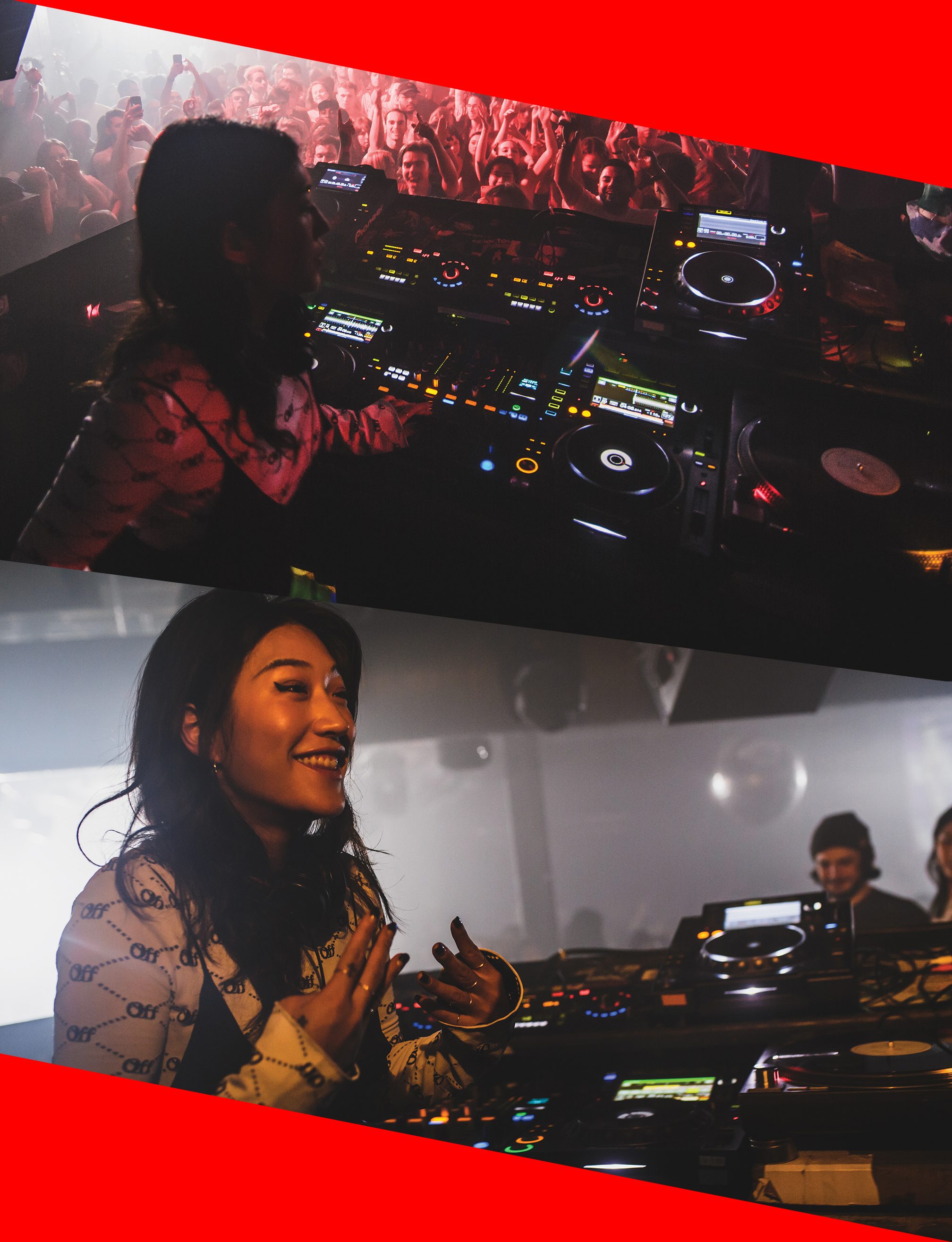
But Peggy’s experiences with the industry at the beginning of her career often left her feeling dispirited – she describes feeling that her musical skill and knowledge were being questioned, offensive nicknames (“the guys at one label used to make fun of my Korean name on work emails behind my back”) and worst of all, simply feeling devalued as an artist. “It really upsets me when I hear rumours that a label only released my music because ‘sex sells’. Like wow, that hurts.” She looks sad for the first time during our conversation, which until then has been marked by giggles and infectious enthusiasm going at 100mph.
In retrospect, Gou is more sanguine. “Sometimes men in the industry get insecure when confronted with an independent woman. They have to feel like…” (here she mimics someone flexing muscles and showing off) “...like they have to be in charge.
But underestimate Peggy Gou at your own risk. In 2016 she lit the internet up when she said in an interview, “I would like to be the youngest and first female Korean DJ that plays Berghain”. A little bit presumptuous, to paraphrase some of the responses on social media, but just months later she was ascending the elevator to Panorama Bar. It was her first gig with her agent, Ana Rosas, who remembers the occasion well. “She was totally in her zone, when the world disappears and you just do what you love. I’m feeling goosebumps right now, I was so impressed!” Peggy, on the other hand, was incredibly nervous – all the more so for being so much of a regular at the club that she’d even named the area she would stand in to dance every week ‘Peggy’s Zone’. After her set, she remembers, she was most pleased by a text from a friend who said it seemed like she’d been playing there for 20 years. Boiler Room followed, and then, the world.

Later that evening, we’re at XOYO for another kind of Artwork – the third edition of Artwork’s 13-week residency at the club, to be exact, where she’s lined up to play alongside Arthur and Liverpool breakthrough star Or:la. Peggy arrives in a huge, fluffy pink hat and a long coat; Or:la, playing before her, gives her a huge hug and the two briefly chat before changing over.
“The first time I was in Peggy’s company we were watching Pete Tong’s Heritage Orchestra at a festival. We didn’t know one another and weren’t properly introduced so it was pretty random,” Or:la says after the gig. They met properly during 2017’s Warehouse Project season and became proper friends, having shared lots of line-ups together. Now, they’re big supporters of each other’s productions.
Seconds later Artwork steps up to the microphone and introduces her: “Peggy fucking Gou!” The whole crowd roars back, “Peggy, Peggy, Peggy fucking Gou!” People often shout her name so loudly during her sets that you can barely even hear what she’s playing. Two hours of bumping house, gently landing acid and sprinkles of techno fly by. She regularly teases the low end in and out, getting the crowd even more worked up. When she plays one of her own tracks, ‘Six O Six’, a soft acid cut featuring her counting in Korean, a group of Asian fans at the side of the stage signal at her madly. “Every time I play there’s always Asian people,” explains Gou. “They’re giving me high fives on every track and I’m like, you know what, I love the fact that you’re on my dancefloor, I’m proud!”
And Gou is a proud Korean woman. She has experimented a lot with incorporating traditional Korean music into her work and lays down vocals in Korean; soon she’s taking a few weeks off to learn a Korean instrument called the gayageum to add even more organic sounds to her production arsenal. It’s the component of her music that her parents – always critically honest when Peggy plays them her work – get most excited about. She recently uploaded a video of her dancing to her new track while her mum just stands and stares at her phone screen. “I was like mum, this is my new tune, what do you think? Sometimes she says no!”
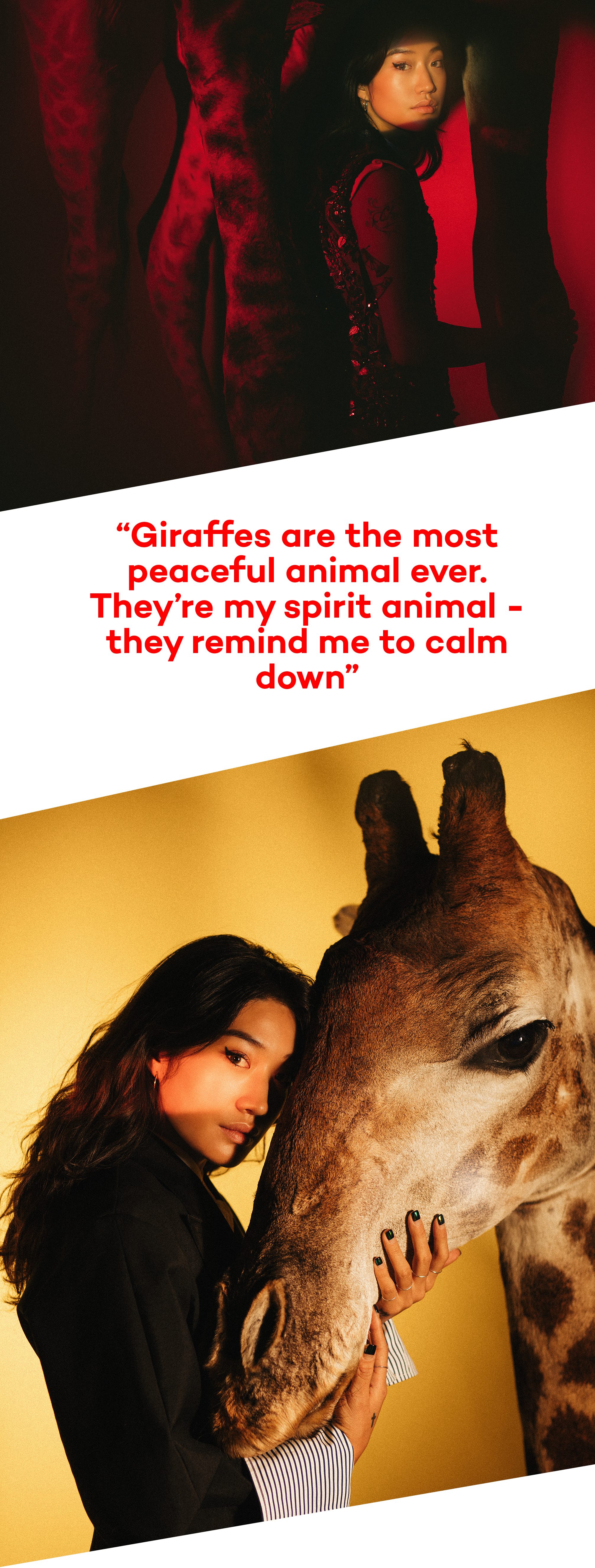
While Peggy’s parents are proud (and most importantly, she beams, “they know I love it”), they weren’t always overjoyed about their daughter’s decision to take music seriously. Gou was studying fashion in London with her parents supporting her. But during her studies, she realised that she wanted to pursue music and started to skip classes, instead going to a studio with Highlife’s Esa and learning production. She failed her course, and her parents told her that she couldn’t come back to Korea until she passed it (she did eventually). “Asian parents can be very conservative – they want their kids to be doctors and professors,” she says, matter-of-factly. “Nowadays, it’s getting better. A lot of people are more open-minded, there are more tattoos...”
Tattooing is technically illegal in Korea, and when Gou goes back there she still gets some looks from more old-fashioned people. She can’t visit one of her cousins in South Korea because they hate her tattoos.“They think that what your parents gave you, you have to cherish that, you cannot fuck it up.” But it doesn’t make her feel regretful about inking her body; in fact, she says that tattoos make her identity more visible: “I feel like tattoos are Peggy Gou,” she says. “I like this one because the woman is doing the work,” she continues, lightly touching the skin around a tattoo of a man and woman in a rowing boat. In Korea, there’s a traditional mindset about gendered roles, but Peggy says she grew up with the opposite. “If they can do it, I can do it!” was her internal mantra.
Her voice quietens again, a sign that she’s shifted on to a more personal topic. “My brother was always the good student, so that’s why my parents always worried about me: ‘What’s wrong with our daughter?’” But since she’s become an international success, and they can see that she’s doing what she loves on a daily basis, their views have changed. In fact, her father told her recently that he’s learned something from her: if your child doesn’t listen to you… they’re going to do well.
Peggy’s parents may not have supported her move to Berlin at first, but it’s undoubtedly worked out well for her. But although she lives just five minutes from Berghain, she rarely goes out clubbing any more. Instead, she’s been going to the gym – motivated by none other than Honey Dijon. She mimes being on the phone: “Honey was like, ‘I’m in the gym!’ and sent a photo. I was like, ‘I’m coming!’”
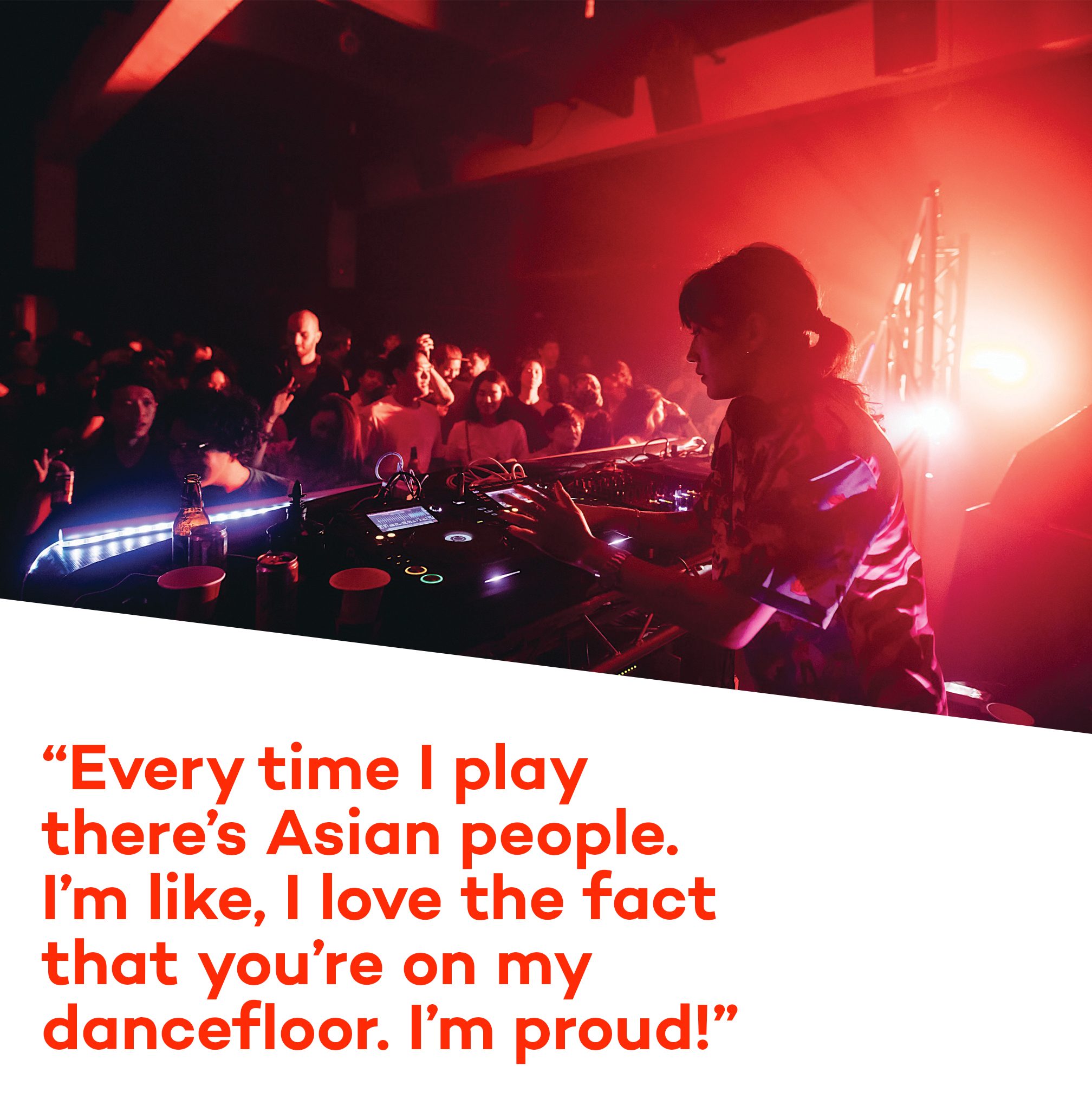
Gou's hyperactivity is so infectious you wonder if Honey knows what she’s letting herself in for. Her fascination with giraffes, she says, is because of the contrast: “They’re the most peaceful animal ever. They’re like my spirit animal – they remind me to calm down. When I look at them, I feel peaceful. Maybe I was a giraffe in my past life…” she trails off. Then, in a sort of muffled shout she describes the moment she discovered why promoters across the world were suddenly giving her giraffes at gigs. “It’s on my rider? Ana Rosas, did you put this on my rider?!” Today, her huge giraffe collection comes from a variety of cities and includes a huge, 2m tall model that lives in her home studio.
With her spirit animal by her side, Peggy writes music in the studio next to her bed. Aided by the power of coffee and turmeric shots, she’ll sketch out a track, leave it and come back to it later: “I realised that sometimes I get stuck after seven or eight channels,” she says. She will often use chords from jazz, and she also lays down notes from her piano. Her brother is a talented pianist and when he plays a great piece in her presence, she’ll ask, “Can you only play the left hand? That could be an amazing bassline!”
Peggy’s sound merges rolling house with bubbling 80s disco vibes and a touch of acid, which is channelled through a Roland Jupiter synth. “I want the Peggy sound to be housey and acid,” she says. Her latest EP for Ninja Tune is vibrant house with shoulder-wiggling jazz basslines and punchy drums that hint ever so subtly at her more acidic side; Peggy sings lyrics written in Korean by her friend Maktoop on stand-out ‘It Makes You Forget (Itgehane)’. A further EP follows in mid April on another of her favourite labels, Phonica.
But beyond her new music, Peggy has wider plans, including the dream of a stall selling organic vitamin juices – “It’s one of those things where you drink it and you’re like, I’m getting better, I’m healthy today!” – and even an art exhibition. Clearly, creativity isn’t just left to her umbrella-wielding fans. She’s even designed a custom-made battery-powered fan to use in clubs and had thousands made as gifts for her fans at shows. When switched on, its LEDs spell out ‘Have a Gou time, love from Peggy’. When she showed it to Jackmaster at a gig in Glasgow, “he stared at it and went, ‘What the fuck?’ Then took it and ran around waving it in the DJ booth and in people’s faces!” The quiet Barbican café is interrupted by an explosion of laughter at Peggy’s vivid re-enactment.
Again, she quietens, a look of intense focus replacing the mirth of a few moments before. “This DJ thing is not going to be forever,” she says. “I don’t consider myself just a DJ; I want to be an artist who can do everything, if I can.”
Given how swiftly she’s come to dominate the world behind the decks, it’s a case of watch out universe; Peggy Gou is coming. And the giraffes are coming with her.
Peggy Gou’s ‘Once’ EP is out March 2 on Ninja Tune
Peggy Gou fan? Head to Mixmag's artist page to stay up to date with all things Peggy
Aurora Mitchell is a freelance writer and regular contributor to Mixmag, follow her on Twitter

